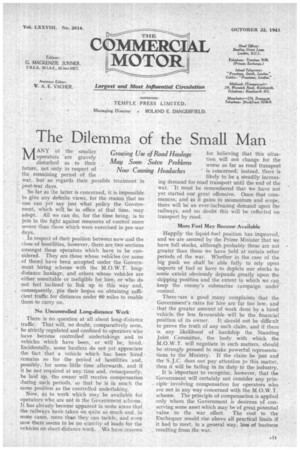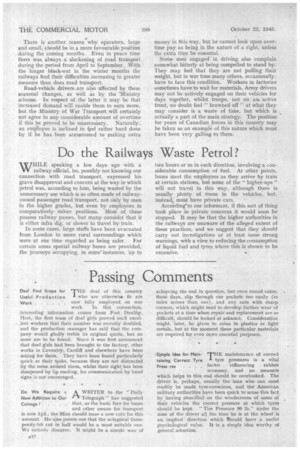The Dilemma of the Small Man
Page 13

Page 14

If you've noticed an error in this article please click here to report it so we can fix it.
MANY of the smaller operators are gravely disturbed as to their future, not only in respect of the remaining period of the war, but as regards their possible treatment in post-war days.
So far as the latter is concerned, it is impossible to give any definite views, for the reason that no one can yet say just what policy the Government, which will be in office at that time, may adopt. All we can do, for the time being, is to join in the fight against measures of control more severe than those which were exercised in pre-war days.
In respect of their position between now and the close of hostilities, however, there are two sections amongst these operators which have to be considered. They, are those whose vehicles (or some of them) have been accepted under the Government hiring scheme with the M.O.W.T. longdistance haulage, and others whose vehicles are either unsuitable or ineligible for hire, or who do not feel inclined to link up in this way and, . consequently, pin their hopes on obtaining sufficient traffic for distances under 60 miles to enable them to carry on.
No Uncontrolled Long-distance Work There is no question at all about long-distance traffic. That will, no doubt, comparatively soon, be strictly regulated and confined to operators who have become controlled undertakings and. to vehicles which have been, or will be, hired. Incidentally, some hauliers do not yet appreciate the fact that a vehicle winch has been hired • " remains so for the period of hostilities and, possibly, for some little time afterward, and if it be not required at any. time and, consequently, be laid up, the owner will receive compensation during such periods, so that he is in much the same position as the controlled undertaking.
Now, as to work which may be available for operators who are not in the Government scheme. It has already become apparent in sorfie areas that the railways have taken on quite as-much and, in some cases, more than they can tackle, and even now there seems to be no scarcity of loads for the vehicles on short-distance work. We have reas,onsi for believing that this situation will not change for the worse so far as road transport is concerned; instead, there is likely to be a steadily increasing demand for road transport until the end of the war. It .must be remembered that we have not yet started our great offensive. Once that commences, and as it gains in momentum and scope, there will be an ever-indeasing demand upon the railways, and no doubt this will be reflected on transport by road. .
More Fuel May Become Available Happily the liquid-fuel position has improved, and we are assured by the Prime Minister that we have full stocks., although probably these are not greater than those we have .held at certain other periods of the war. Whether in the case of the big push we shall be able fully to rely upon imports of fuel or have to deplete our stocks to .sonic extent obviously depends greatly upon the shipping position and the extent to which we can keep the enemy's submarine campaign under control.
There •are a good many complaints that the Government's rates for hire are far too low, and that the greater amount of work done by a hired vehicle the less favourable will be the financial position of its owner. It should not be difficult to prove the truth of any such claim, and if there is, any likelihood of hardship the Standing Joint Committee, the body with which the M.O.W.T. will negotiate in such matters, should be strongly pressed to make powerful representations to the' Ministry. If the claim be just and the S. J.C. does not pay attention So this matter, then it will be failing in its duty to the industry.
It is irhportant to recognize, however, that the Government will certainly not consider any principle' involving compensation for operators who are not in any way concerned with the M.O.W.T. scheme. The principle of compensation is applied only where the Government is .desirous of conserving some asset which may be of great potential value to the war effort. The cost to the Exchequer would rise above all practical limits if it had to meet, in a general way, loss of business resulting from the war. There is another reason why operators, large and small, should be in a more favourable position during the coming months. Even in peace time there was always a slackening of road transport during the period from April tO September. With the longer black-out in the winter months the railways find their difficulties increasing in greater measure than does road transport.
Road-vehicle drivers are also affected by these seasonal changes, as well as by the 'Ministry • scheme. In respect of the latter it may be that increased demand will enable them to earn more, but the Ministry of War Transport, will certainly not agree to any considerable amount of overtime if this be proved to be unneces-sary. Naturally;. an employee is inclined to feel rather hard done by if he has been accustomed to making extra money in this way, but he cannot look upon overtime pay as being in the nature of a right, unless the extra time be essential. Some men engaged ut driving also complain somewhat bitterly at•being compelled to stand by. They may feel that they are not pulling their weight, but in war time many others, occasionally. have to face this condition. Workers in factories sometimes have to wait for materials, Army drivers may not be actively engaged on their vehicles for days together, whilst troops, not on an. active front, no doubt feel "browned off " at what they may consider is a waste of time, but which is actually a part of the main strategy. The position for years of Canadian forces in this Country may be taken as an example of this nature which must have been very gallingto them.




















































